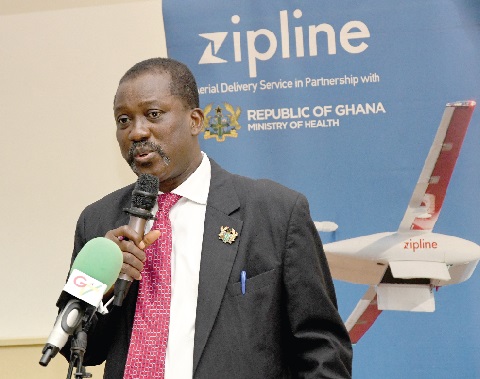
Policy guide for drone services needed — MoH
The Ministry of Health (MoH) has called for the establishment of a policy framework to guide aerial logistics services, otherwise known as drone services, in the country.
He explained that there was no such policy at the moment in the country, and that putting it in place would give clear directions as to where the drones could go, what they could do and the commodities they could deliver at any point in time.
"There are proposals to even deliver drugs from pharmacies to people's homes. All these are things that we have to sit down with stakeholders to see what can be done and what can't be done so that there are specific policies guiding them in order that people do not just stand up to fly drones to people's homes under the pretext of delivering medicines," he said.
The Chief Director of the Ministry of Health, Kwabena Boadu Oku-Afari, said this when he represented the sector minister, Kwaku Agyeman-Manu, at a roundtable meeting organised by the ministry with its partners.
The meeting was attended by officials of the Ghana Health Service (GHS) and various local health agencies.
It was dubbed: "Three years of integrating aerial logistics in health supply chain management in Ghana — successes, challenges and opportunities".
Medical drone delivery
Government of Ghana, through the MOH, the GHS and Zipline Technology, launched the world’s largest medical drone delivery network in April 2019 at Omenako in the Eastern Region.
The effort provided an ability to deliver just-in-time life-saving health commodities to previously unreachable populations.
Mr Oku-Afari said since the launch of the medical drone distribution centre, six centres had been built across the country in the Ashanti, Western North, North East and Oti regions with distribution coverage across 13 regions.
He said Zipline now served vaccines, blood and medical products to approximately 2,500 facilities under the GHS, the National Catholic Health Service and other prominent faith-based organisations across 147 districts in the country.
Mr Oku-Afari said the drone service had made it possible to deliver vaccines, antirabies medication, antisnake venoms and medicines to hard-to-reach areas within 15 to 20 minutes where road transport would have used over two hours.
Bold decision
The General Manager of Zipline, Mawuli Atiemo, said the government’s bold decision to roll out the drone technology in healthcare delivery had sparked great interest around the world, adding that the company had received a grant facility from the United States Trade Development Authority for a feasibility study into areas of expansion and for other use cases in Ghana and Nigeria.
He said the company had supported the GHS vaccination campaigns by delivering more than 5.9 million child vaccines to health facilities in communities with uneven geographic landscapes and others that did not have the required storage facilities.
“In the Western North Region, for instance, where we are the sole distributor of child vaccines, the previous challenges of delay in the transport of medications, unavailability of storage systems for vaccines and administrative bottlenecks no longer pose a threat to healthcare delivery since we rolled this partnership. This outcome has contributed to reduction in childhood morbidity, and kept more children alive,” he said.
